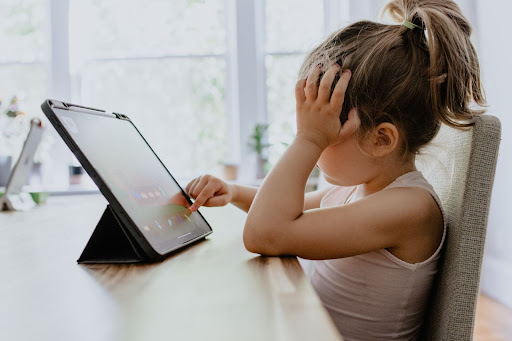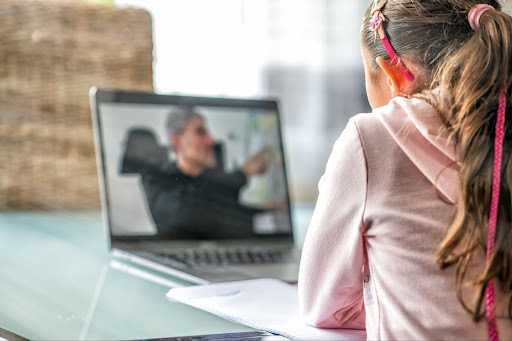Over the last few years, virtual learning has become more popular than ever, with many children being able to learn and complete schoolwork from home. Virtual learning has been up for debate for some time since parents are required to stay home to observe their children if they’re learning online. In addition, virtual learning may prove more distracting than learning in class because children are surrounded by toys, video games, other family members, and pets. However, virtual learning can impact children (and adults) in other ways, such as being detrimental to their mental health.
We already know that devices and screens have negative consequences on our physical and mental health, so it’s no wonder scientists and researchers around the globe are questioning virtual learning’s effect. Unfortunately, while virtual learning may be beneficial in some aspects, it can cause anxiety and other emotional issues. Here are a few ways virtual learning can impact mental health and cause anxiety:
Fatigue

You may have heard of Zoom fatigue in regard to remote work. But, Zoom fatigue also affects learners of all ages. Video conferences, whether they’re with a boss or a classroom, can cause exhaustion in all types of people. While this isn’t a medical condition, Zoom fatigue has been proven to exist. This is especially true when it comes to virtual learning. It requires learners to stay on the computer for long hours.
During online classes, students receive tons of information while staring at a screen, both of which can be mentally draining. In addition, because there’s less interaction with other students and fewer opportunities to participate, students don’t have the same mentally stimulating activities they do in a real classroom.
Virtual learning may also make it more difficult for students to learn because they feel tired. This leads to even more stress and anxiety for students, their parents, and teachers.
Lack of Social Interaction
Feelings of isolation can increase anxiety, and online learning can increase feelings of isolation, putting students in a never-ending cycle. One of the most important aspects of school isn’t learning; it’s the socializing that children can do between classes to help them learn how to become members of society. These social interactions are arguably just as important as the learning they do in the classroom. Why? It allows them to communicate with others.
Online learning offers some interaction but not on the same level as in-person classroom learning. So, students may start feeling socially isolated, which can increase mental health problems.
Separating School and Home
When adults work remotely, one of their top issues is unplugging at the end of the workday to focus on their personal lives. The same is true for students. Students have a schedule they follow whether they‘re learning online or in person. However, the structure is slightly different. When students learn in traditional classrooms, they wake up, go to classes, do homework, and hang out with friends or do extracurriculars. With online learning, staying focused while in the classroom isn’t as easy. While there are still regular times for classes, it’s virtually impossible to separate home life from school life, especially if students don’t have a regular routine at home. As a result, students may procrastinate getting their homework done, causing more stress and pressure later.
Students Aren’t Alone
Students aren’t the only ones to experience mental health issues associated with learning online. Online learning also affects parents who must become educators and tutors. This takes getting more involved in their children’s schooling and taking time away from work. In some cases, parents aren’t always the best tutors and getting overwhelmed by being a proxy educator while trying to work can cause exhaustion.
Additionally, teachers and school faculty can experience anxiety from online learning. Most teachers don’t learn how to teach in a virtual setting when studying education in college. In addition, teachers who have been teaching in a classroom setting for many years don’t know how to teach online, especially in schools that aren’t technically savvy. Teachers feel more pressure than ever when teaching online, and many worry about losing their jobs if there’s ever a school closure. In addition, teaching online comes with additional responsibilities to ensure students are being properly educated.
Can Learning Online Reduce Anxiety?
While learning online can cause anxiety in some students, it may reduce feelings of anxiety in others. Online learning allows families to spend more time together and encourages bonding through learning at home. Parents who previously didn’t spend much time with their kids due to work can now spend more time with the entire family, especially if they work from home.
In addition, some students may have anxiety in a traditional classroom for several reasons. For example, one of the most common reasons students may want to avoid going to school is because of bullying. However, with online learning, students don’t have to deal with the same level of bullying and may be able to avoid their bully altogether, providing them with a safe space where they can focus on learning instead of social anxiety.
Of course, online learning doesn’t prevent students from getting cyber-bullied. So it’s up to schools to educate students about the right behavior online.
Can You Reduce Negative Mental Health Effects of Learning Online?
There are ways to care for a student’s mental health while learning online. Here are a few tips to ease anxiety caused by virtual learning:
- Set a firm schedule to separate school and home
- Encourage healthy habits like regular sleep, eating healthy, and taking time for physical activity
- Limit screen time after school when possible
Parents can help their children reduce their anxiety by practicing self-care and following the same schedule so everyone knows what to expect from their day. In addition, families can invest in online therapy to help them overcome feelings of anxiety that may come with virtual learning. By working with a mental health professional, you and the doctor can decide whether depression and anxiety medication is needed to help overcome the anxiety. While screens may negatively impact mental health for various reasons, they’re not inherently bad; other factors likely induce anxiety in students learning online.













